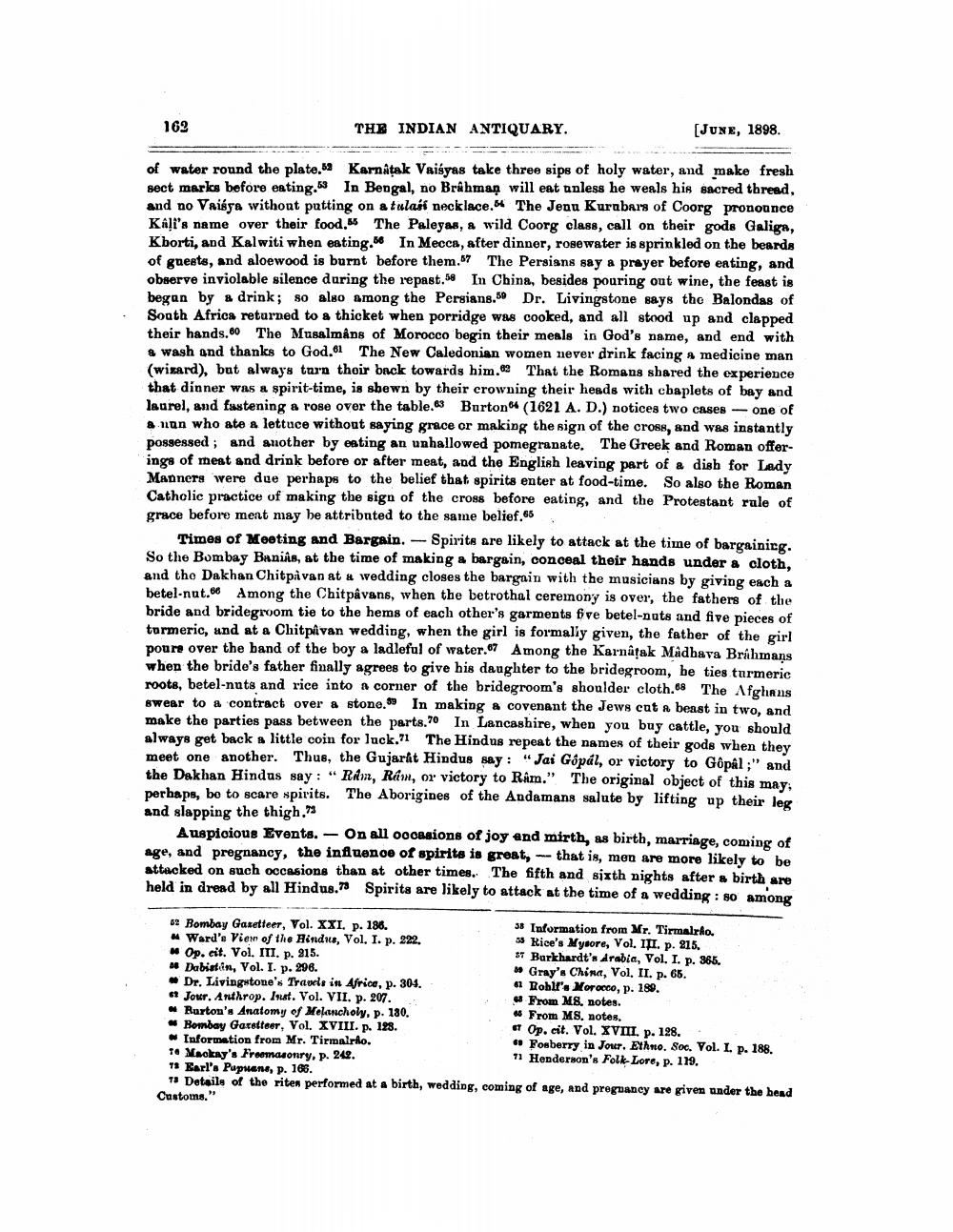________________
162
THE INDIAN ANTIQUARY.
(JUNE, 1898.
of water round the plate.52 Karnatak Vaiấyas take three sips of holy water, and make fresh sect marks before eating 53 In Bengal, no Brahman will eat unless he weals his sacred thread, and no Vaibya without putting on a tulasi necklace. The Jenu Kurubars of Coorg pronounce KAļi's name over their food. The Paleyas, a wild Coorg class, call on their gods Galiga, Kborti, and Kalwiti when eating. In Mecca, after dinner, rosewater is sprinkled on the beards of guests, and aloewood is burnt before them.57 The Persians say a prayer before eating, and observe inviolable silence during the repast.5e In China, besides pouring out wine, the feast is began by a drink; so also among the Persians.58 Dr. Livingstone says the Balondas of South Africa returned to a thicket when porridge was cooked, and all stood up and clapped their hands.60 The Musalmans of Morocco begin their meals in God's name, and end with
wash and thanks to God.61 The New Caledonian women never drink facing a medicine man (wizard), but always turn their back towards him. That the Romans shared the experience that dinner was a spirit-time, is shewn by their crowning their heads with chaplets of bay and laurel, and fastening a rose over the table.63 Burton (1621 A. D.) notices two cases - one of a non who ate a lettuce without saying grace or making the sign of the cross, and was instantly possessed ; and another by eating an unhallowed pomegranate. The Greek and Roman offerings of meat and drink before or after meat, and the English leaving part of a dish for Lady Manners were due perhaps to the belief that spirits enter at food-time. So also the Roman Catholic practice of making the sign of the cross before eating, and the Protestant rule of grace before ment may be attributed to the same belief."
Times of Mooting and Bargain. - Spirits are likely to attack at the time of bargainicg. So the Bombay Banis, at the time of making a bargain, conceal their hands under a cloth, and the Dakhan Chitpaivan at a wedding closes the bargain with the musicians by giving each a betel-nut.66 Among the Chitpâvans, when the betrothal ceremony is over, the fathers of the bride and bridegroom tie to the hems of each other's garments five betel nuts and five pieces of turmeric, und at a Chitpivan wedding, when the girl is formaliy given, the father of the girl poure over the band of the boy a ladleful of water.87 Among the Karnatak Madhava Brahmans when the bride's father finally agrees to give his daughter to the bridegroom, be ties turmeric roots, betel nuts and rice into a corner of the bridegroom's shoulder cloth.68 The Afghans swear to a contract over a stone. In making a covenant the Jews cut a beast in two, and make the parties pass between the parts.70 In Lancashire, when you buy cattle, you should always get back a little coin for luck. The Hindus repeat the names of their gods when they meet one another. Thus, the Gujarat Hindus say: "Jai Gópál, or victory to Gopal ," and the Dakhan Hindus say: "Rain, Rám, or victory to Rám." The original object of this may, perhaps, bo to scare spirits. The Aborigines of the Andamana salute by lifting up their leg and slapping the thigh.79
Auspicious Events. - On all occasions of joy and mirth, as birth, marriage, coming of age, and pregnancy, the influence of spirits is great, -that is, men are more likely to be attacked on such occasions than at other times. The fifth and sixth nights after a birth are held in dread by all Hindus.7 Spirits are likely to attack at the time of a wedding : so among
52 Bombay Gazetteer, Vol. XXI. p. 188.
38 Information from Mr. Tirmalrio. Ward's View of the Hindus, Vol. I. p. 222.
SS Rice's Mysore, Vol. III. p. 215. * Op.cit. Vol. III. p. 215.
ST Barkhardt's drabia, Vol. I. p. 365. * Dabistis, Yol. I. p. 296.
^ Gray's China, Vol. II. p. 65. Dr. Livingstone's Travels in Africa, p. 304.
4 Robir'. Morocco, p. 189. ** Jour. Anthrop. Inst. Vol. VII. p. 207.
From M8, notes. · Rurton's Anatomy of Melancholy, p. 180.
From MS. notes. "Bombay Gazetteer, Vol. XVIII. p. 128.
of Op. cit. Vol. XVIII. p. 128. Information from Mr. Tirmalrio.
“Forberry in Jour. Ethno. 800. Vol. I. p. 188. 16 Maclay's Freemasonry, p. 242.
71 Henderson's Folk-Lore, p. 119. 11 Earl's Pupuan, p. 185.
13 Details of the riten performed at a birth, wedding, coming of age, and pregnancy are given under the head Customs."




